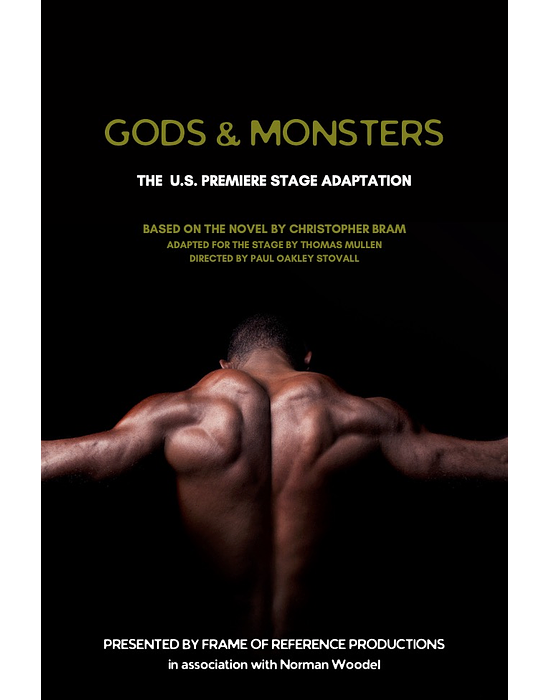
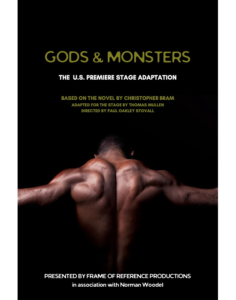 ***** Another World Premiere comes to a Chicago stage, in this case, Theater Wit, where the creative team knows it will get important and helpful feedback to continue developing a show that is destined to have life after it’s local run.
***** Another World Premiere comes to a Chicago stage, in this case, Theater Wit, where the creative team knows it will get important and helpful feedback to continue developing a show that is destined to have life after it’s local run.
This new stage adaptation of “Gods and Monsters” is based on the 1995 powerful novel, “Father of Frankenstein,” by Christopher Bram, but the story is likely better known from the 1998 film adaptation, “Gods & Monsters” starring Ian McKellen as the legendary director of horror films (including Frankenstein and Bride of Frankenstein), and Brendan Fraser (who delivered an unforgettable performance as young landscaper, Clayton Boone; interesting note: Fraser’s manager allegedly advised him not to take the role….bad advice). The movie lives on with a strong cult and LGBTQ+ following.
James Whale was indeed a real person who occupies the center of this story; that said, the story is a fictionalized account of the last days of Whale’s life which puts it in 1957. The premise has Whale, who was well known to be gay, smitten with a handsome young landscaper named Clayton Boone just one of the many young men that Whale pursued for sexual encounters.
The play opens with a glimpse at Whale’s youthful days cleverly presented (more on this later), but soon a young student journalist named Edmund Kay (played by promising actor Ethan Check who makes his professional theatrical debut in this production) is on the scene to visit the famed director with an obsession for Whale’s horror films direction. Check, like all the actors except for those playing Whale and Boone, are part of a small ensemble each of whom plays a multitude of roles.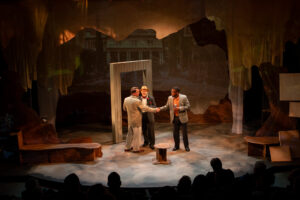
Scott Westerman embodies James Whale in a true standout performance. Westerman is well known to Chicago audiences for his work at Chicago Shakespeare, Northlight, Lookingglass and many other popular Chicago-based theaters. Surrounded by the strong cast and their multitude of roles, Westerman is clearly the force of this show. He tackles James (Jimmy”) Whale presenting him as a multi-faceted character. Not just a gay man who seeks dalliances with young men, but also as a talented director well respected in Hollywood but clearly a man who fought against many demons, and indeed with monsters in his head and physical challenges confronting him as well. Westerman portrays the demanding complex role with power and strength. With all his faults, it’s critical that the audience feels sympathetic towards Whale, perhaps even likes him and Westerman accomplishes that perfectly.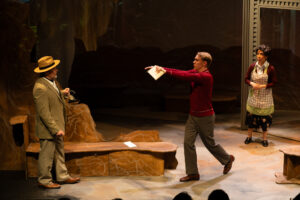
The young landscaper, Clayton Boone, is portrayed by the actor, writer and artist Rashun Carter who brings a wealth of experience to the stage (including his work in one of my faves, “Reasons: Earth Wind and Fire” at Black Ensemble). His portrayal includes the initially homophobic traits we saw in Fraser’s film performance, but this re-imagination of the show introduces racial disparity. Here, Boone is a man sensitive to and focused on racial unfairness; yet, somewhat ironically, he lives with his own bigotry regarding sexual orientation. Over the course of the short time period covered by the play, Clayton comes to achieve some enlightenment seeing the complexity of Whale’s struggling existence. Not sure the same can be said for others acceptance of racial equality.
Race is the launching pad from which the play takes a notable shift in direction from the original book AND the film.
For those like me who have seen the movie several times, there is an expectation that the play will be about the guarded secret lives of gays in the late 1950s, where private lives were an open secret at Hollywood parties. Indeed, among the large number of gay figures to whom the play nods, we hear a lot about, not just James Whale, but also about the iconic director George Cukor who was a prominent director but also a leader in Hollywood’s gay subculture in the 1930’s and beyond.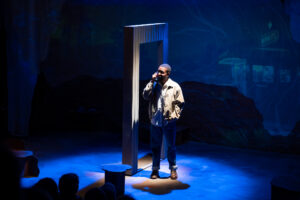
This script, written and adapted by Tom Mullen, makes its most important shift by calling for Boone to be played by an African American actor. Interestingly, these days, changes in race or gender casting is hardly noted since that world has become so very fluid. In this case, Boone becomes a voice for racial discrimination being newly introduced into the story.
No play demonstrates the prevalence of fluid casting better than Hamilton which turned traditional casting on its head. So I found it a stroke of genius to bring in Chicago-based Paul Oakley Stovall (an activist and also well known to Chicago audiences for playing George Washington in the national tour of Hamilton) as the play’s director. He is perfectly suited to tackle the issue of race in a play where it had not been of note.
Perhaps consequential to the introduction of the race issue, a plot emphasis is placed, not just on the Frankenstein films for which Whale is so well known, but also his work as the director of the 1936 film, “Show Boat” starring the late and great African American actor/singer Paul Robeson who played “Joe” and of course sang the unforgettable song, “Ol’ Man River.” We see that Whale himself didn’t seem to fully digest the importance of race and its portrayal in film.
Foreign to the 1998 film, the introduction of race now allows a deeper recognition of the extent to which race was indeed a factor that was not ignored in 1930’s Hollywood and beyond. To further the emphasis, the role of Whale’s housekeeper Maria Ramirez, well played with touches of humor added in by Chicago born, now LA Based actor Doreen Calderon. The character of Maria is Latina in the book and film, but here, it permits the issue of racial discrimination to extend to the ill treatments of Hispanics. Indeed, the character boldly notes in an interaction with Clayton about race, that her family came to this country legally (a point made likely to allay any prejudice that might get triggered in a less understanding audience than that represented in Chicago). The issue of discrimination is therefore addressed as a wrong without the political baggage regarding legal immigration.
Interestingly, many may think that members of gay Hollywood of the day were notably enlightened; not so fast, our eyes are opened when we see that even gay men like Cukor ordered Boone (who was attending a party at Cukor’s home as Whale’s guest) to stay in the kitchen so as not to be seen. It’s a startling and disturbing moment that reflects an undeniable reality.
So what exactly does “Monsters” refer to in the title? The original film would have us believe the reference is to the discrimination against the LGBTQ+ community, but with the revised script, one may think it’s a now a reference to those who discriminate on race as well. But alas, while racism and secret gay lifestyles are prominent themes, we are reminded that while important, they are likely not the intended reference for the title, for at its core, this is the story of James Whale. The main story line, important political themes aside for a moment, this is still a story about the late life struggles of the legendary horror film director. Whale indeed references the “monsters in his head,” the demons he must fight a complex reference.
This production is built on a modest budget with hope that future productions will attract producer money. And given the well attended previews, it is clear that audiences want to check it out. While the budget is seen thru its simple set and a shifting of scenes accomplished solely thru the adjustment and positioning of a doorway, it is also clear that significant funding was directed into the extensive use of projection which not only helps clarify the story, but to further it and enhance it. It also makes perfect sense since this is the story of a film maker. The opening moments, referenced earlier, show us a bit of Whale’s childhood but it’s done thru the lens of a live video feed of a young Jimmy on the stage. And while we see live actors portray a scene from Bride of Frankenstein, behind the projection screen, the scene is enhanced thru imposed actual film footage (which I understand the rights for came only days before the production opened) adds a rich layer of authenticity to the scene, the characters and the story. It’s only 26 seconds allowed by the film company, but it’s worth it’s weight in impact.
There are also some very funny lines and takes in the script, many given to housekeeper Maria, but a laugh out loud moment is Clayton’s explaining to Whale (in 1957 America) that a roach clip was so named because “potholder was already taken.”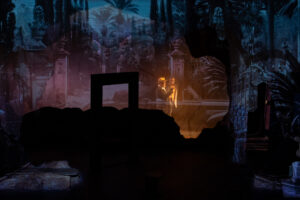
Candidly, I left the theater and wrestled for some time over whether the introduction of the race element into the story was a necessary part of a re-imagination. Not that it wasn’t a real thing in the late 1950’s (as it continues to be today), because it most certainly was; my question was whether it was necessary to this new re-telling of the story. I wondered what the book’s author, Christopher Bram might think of such a major shift. As luck and intent would have it, the author was in the audience at the opening, so I pulled him aside afterwards to chat. It turns out he was notably involved in this re-imagining of the show, and not only approved of the changes but Bram expressed to me his wild enthusiasm over the new direction.
Furthermore, in chatting with the production’s director, Stovall, he confirmed that Bram required approval of changes. Most importantly, Stovall and writer Tom Mullen also respected the input and direction offered or required by the author.
This play is a work of mutual respect between author and the creative team that ultimately produces a fresh look at a nearly 30 year old tale; perhaps it was a story that did not need to be refreshed, but in the end is welcome in its new and more thought provoking message.
Gods & Monsters will clearly have a future beyond Chicago; I have little doubt that producer investment in future productions will create a powerful and successful play that may see its day sooner than it thinks at least off-broadway. The creators have vision, they clearly know what this play can become with additional support…for now, they trust Chicago audiences will validate their dream.
You should help them by going to see this play during it’s brief run here at Theater Wit.
———————————
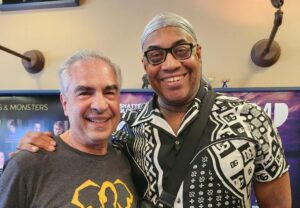 Gods & Monsters runs thru June 2nd at Theater Wit, 1229 W. Belmont Ave.
Gods & Monsters runs thru June 2nd at Theater Wit, 1229 W. Belmont Ave.
Current Showtimes:
Weds, Thurs and Fridays at 7:30pm
Saturdays at 8pm
Sundays at 3pm
**Demand has been high and additional performances are likely to be added so check: www.godsandmonstersonstage.com for additional shows and to purchase tickets. Tickets may also be purchased by calling the box office at 773. 975.8150
Follow the show on social media at: @godsandmonstersonstage
To see what others are saying, visit www.theatreinchicago.com, go to Review Round-Up and click at “Gods and Monsters”



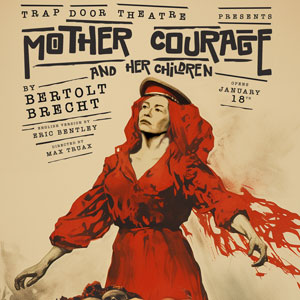


More Stories
“the distrikt of lake michigun”
“Mother Courage and Her Children” reviewed by Jacob Davis
“The Pillowman” reviewed by Frank Meccia